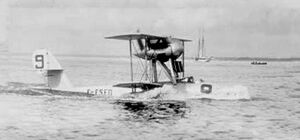Engineering:CAMS 38
| CAMS 38 | |
|---|---|

| |
| Role | Single-seat racing flying-boat |
| National origin | France |
| Manufacturer | CAMS |
| Designer | Raffaele Conflenti |
| Number built | 1 |
The CAMS 38 was a France single-seat racing flying-boat designed by Raffaele Conflenti and built by Chantiers Aéro-Maritimes de la Seine (CAMS) for the 1923 Schneider Trophy race. The CAMS 38 was withdrawn from the race during the second lap.[1]
Design and development
The CAMS 38 was a single-seat equal-span biplane with a 380 hp (283 kW) Hispano-Suiza 8Fd Spécial inline piston engine faired into the underside of the upper wing.[1] The engine drove a two-bladed pusher propeller.[1] The single-seat cockpit was located forward of the wing leading edge towards the front of the hull.[1]
The CAMS 38 was flown in the 1923 Schneider Trophy race by the company's chief test pilot Maurice Hurel. It was damaged by a wave before takeoff but completed the first lap. During the second lap Hurel was forced to land with a vibrating engine and loss of power.[1] During the following year the aircraft was used for flight trials but was soon scrapped.[1]
Specifications
Data from [1]The Illustrated Encyclopedia of Aircraft
General characteristics
- Crew: one
- Length: 8.32 m (27 ft 3.5 in)
- Wingspan: 8.60 m (28 ft 2.5 in)
- Height: 2.79 m (9 ft 1.75 in)
- Wing area: 202.37 m2 (18.80 sq ft)
- Empty weight: 940 kg (2,072 lb)
- Gross weight: 1,256 kg (2,769 lb)
- Powerplant: 1 × Hispano-Suiza 12Fd Spécial V-12 inline piston engine , 283 kW (380 hp)
Performance
- Maximum speed: 300 km/h (186 mph, 162 kn)
See also
Related lists
References
Notes
Bibliography
- The Illustrated Encyclopedia of Aircraft (Part Work 1982-1985). Orbis Publishing.
 |

